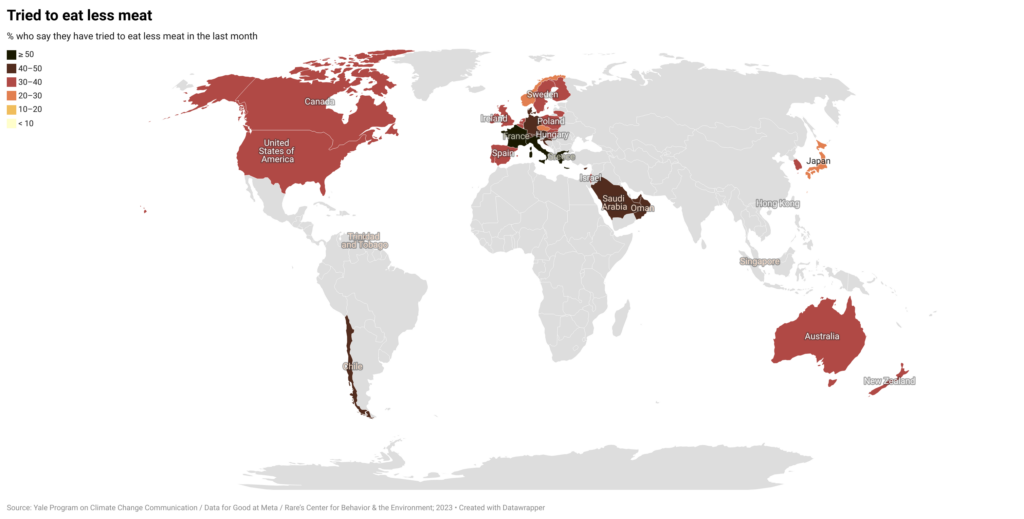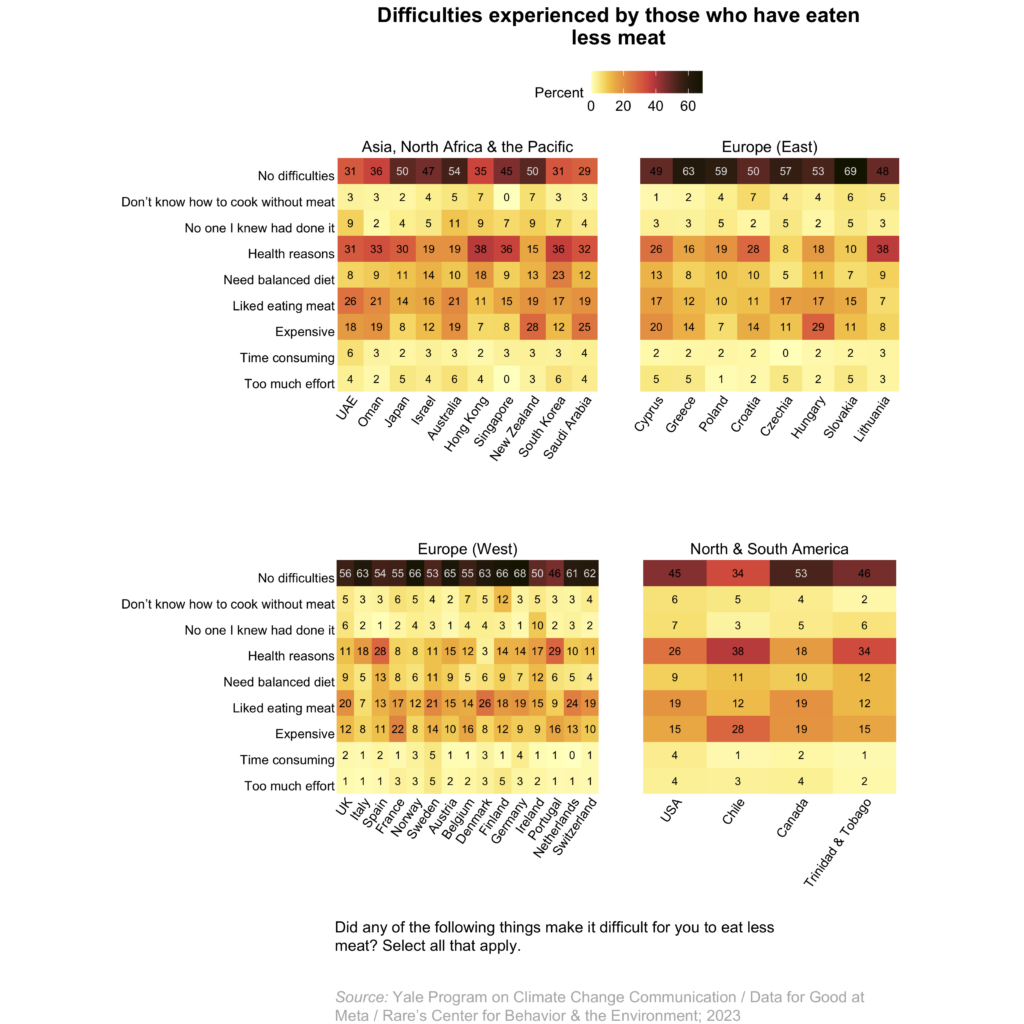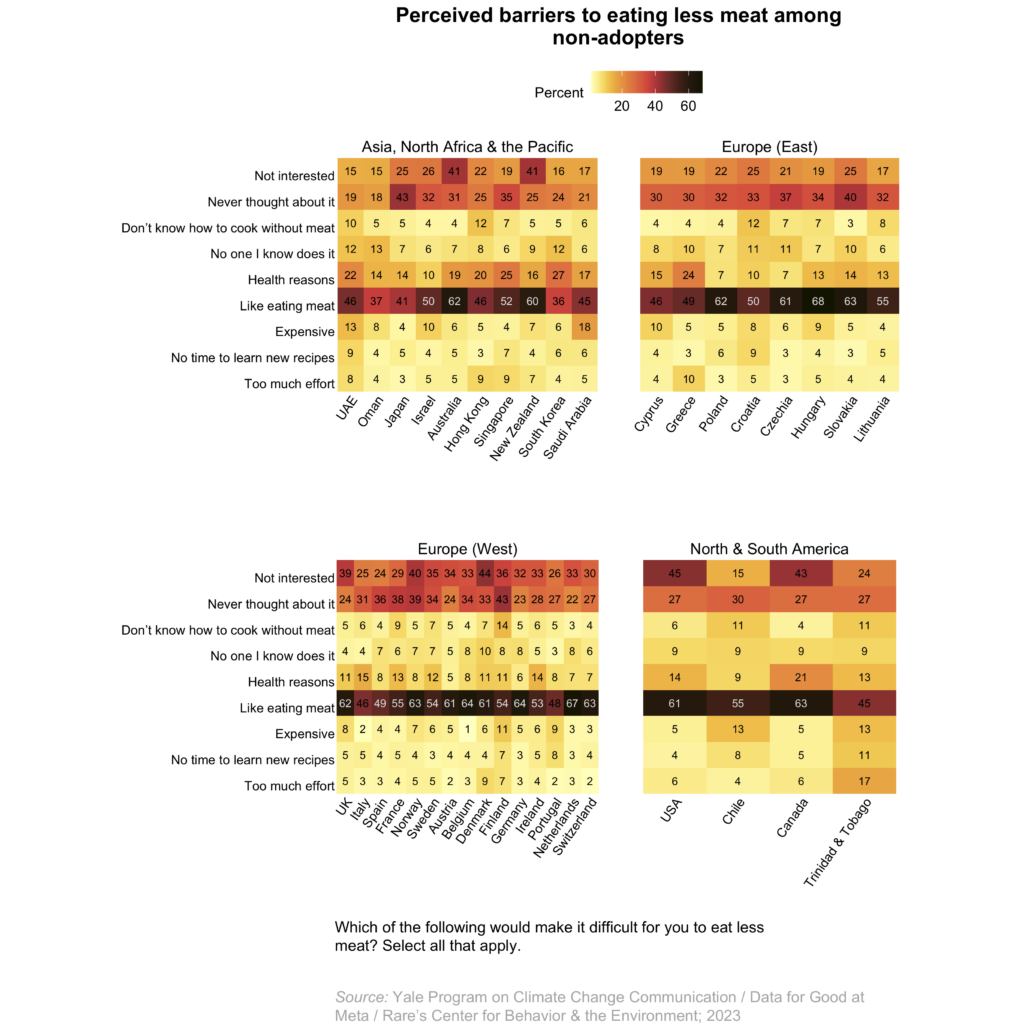Report · Jun 6, 2024
International Public Opinion on Climate Change: Household Climate Actions – Adoption and Barriers, 2023
By Anthony Leiserowitz, Jennifer Carman, Emily Goddard, Erik Thulin, Emily Wood, Marija Verner, Natalia Ordaz Reynoso, Seth Rosenthal, Jennifer Marlon and Nicole Buttermore
Filed under: Behaviors & Actions and Beliefs & Attitudes
3. Reducing Meat Consumption
3.1. Relatively few respondents overall said they had tried to reduce meat consumption, though majorities did in a few countries.
A majority of respondents in 3 out of 37 surveyed countries and territories said they had tried to reduce their meat consumption in the prior month. Respondents in Italy (59%), Greece (57%), and France (55%) were the most likely to say so, while respondents in Norway (27%), Czechia (25%), and Japan (23%) were the least likely to say so.
3.2. Most respondents who had tried to reduce their meat consumption in the past month said they faced no difficulties doing so.
Among respondents who said they had tried to reduce meat consumption in the prior month, majorities in most countries and territories (24 out of 37) said they did not have any difficulties doing so. Respondents in Europe were most likely to say they did not have difficulties, with respondents in Slovakia (69%), Germany (68%), and Finland and Norway (both 66%) most likely to say so. Respondents who reduced their meat consumption were least likely to say they did not face any difficulties in South Korea (31%), the United Arab Emirates (31%), and Saudi Arabia (29%), meaning that they were most likely to say they faced some difficulties.
Respondents in Asia, North Africa, and North and South America were more likely to say that they faced some difficulties reducing their meat consumption. Chile, Hong Kong, and Lithuania (all 38%) had the largest percentages of respondents who said they had concerns about their health. Respondents were allowed to select more than one answer to this question, unless they selected “I didn’t have any difficulties.” Hungary (29%), and Chile and New Zealand (both 28%) had the largest percentages who said it was expensive. Denmark (26%), the United Arab Emirates (26%), and the Netherlands (24%) had the largest percentages who said that they liked eating meat. South Korea (23%), Hong Kong (18%), and Israel (14%) had the largest percentages who said they thought it would be difficult to have a balanced diet without meat. Australia (11%) and Ireland (10%) had the largest percentages who said no one they knew was trying to eat less meat. Finland (12%), followed by Hong Kong, New Zealand, Croatia, and Belgium (all 7%) had the largest percentages who said they didn’t know how to cook meals without meat. Australia and South Korea (both 6%) had the largest percentages who said they thought it would take too much effort. Finally, the United Arab Emirates (6%) and Sweden (5%) had the largest percentages who said it took a lot of time.
3.3. Among those who had not tried to reduce their meat consumption, the most common barriers were liking eating meat, not being interested, or never having thought about it.
Among those who said they had not tried to reduce their meat consumption in the prior month, the most common reasons it would be difficult to do so (i.e., “barriers”) were that they like eating meat, they were not interested in doing it, and that they had never thought about eating less meat.Respondents were allowed to select more than one answer to this question.
Respondents in Hungary (68%), the Netherlands (67%), and Belgium and Germany (both 64%) were most likely to say that they like eating meat, and this was the top-selected barrier in all surveyed countries and territories except one (Japan). The United States (45%), Denmark (44%), and Canada (43%) had the largest percentages of respondents who said that they were not interested in reducing their meat consumption. Japan (43%), Finland (43%), and Slovakia (40%) had the largest percentages who said they had never thought about eating less meat.
Among other barriers to reducing meat consumption, South Korea (27%), Singapore (25%), and Greece (24%) had the largest percentages of respondents who said they need to eat meat for health reasons. Saudi Arabia (18%), and the United Arab Emirates, Trinidad & Tobago, and Chile (all 13%) had the largest percentages who said that it’s too expensive. Trinidad & Tobago (17%) and Greece (10%) had the largest percentages who said that it’s too much effort. Oman (13%), and the United Arab Emirates and South Korea (both 12%) had the largest percentages who said no one they know tries to eat less meat. Finland (14%), and Hong Kong and Croatia (both 12%) had the largest percentages who said they don’t know how to cook meals without meat. Finally, Trinidad & Tobago (11%), and the United Arab Emirates and Croatia (both 9%) had the largest percentages who said they don’t have time to learn new recipes.


